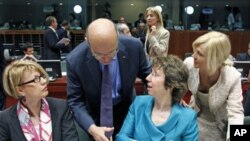European foreign ministers have agreed to impose sanctions against Syrian leader Bashar al-Assad in a toughening response to Damascus' crackdown against popular protests. The ministers also agreed to extend sanctions against Iran.
The latest European sanctions against Syria and Iran respond to the fast-paced developments in the Middle East, which include the turmoil in Libya and the Middle East peace process.
European Union foreign ministers agreed to slap an assets freeze and visa ban against President Bashar al-Assad and nine other members of his government. They also imposed asset freezes and travel bans against about 100 Iranian officials and companies with links to Iran's nuclear program.
Britain's Foreign Secretary William Hague hailed both moves.
"I think it is very important that the European Union is taking this stand and taking it in such a united way," he said. "And I also particularly want to welcome the intensified sanctions against Iran. It is important not to forget while so many things are happening and changing in the Middle East, that Iran continues with its nuclear program."
European and other world powers fear Iran is trying to build a nuclear bomb. Tehran claims its nuclear program is for peaceful purposes.
The E.U. sanctions against Assad follow a similar move last week by Washington, as Syria continues to violently repress anti-government protests. In a keynote speech on the Middle East, President Barack Obama called for Assad to either allow a political transition to democracy or to step aside.
E.U. foreign ministers also discussed toughening their response to another restive Arab country, Libya. Hague said there was a need to intensify military, economic and diplomatic pressure against Libyan leader Moammar Gadhafi.
"I think that intensification of pressure is making progress, is steadily working, although we do not know how long that will take," Hague said.
On Sunday, the European Union also opened a diplomatic office in Libya's rebel stronghold in Benghazi. The move strengthens the rebels' profile, but falls short of formal, diplomatic recognition.
The ministers also welcomed Obama's call for a peace deal between Israel and the Palestinians to be based on 1967 borders. E.U. foreign policy chief Catherine Ashton spoke to reporters on the matter.
"We believe that is a good place to begin the negotiations," she said. "Most importantly, we believe it is in Israel's real interest for the people of Israel, for the people of Palestine to get those negotiations moving now."
The Middle East also is expected to be high on the agenda later this week, when leaders from the G8 group of nations meet in the French city of Deauville.
European Foreign Ministers Add Sanctions to Syria, Iran
- By Lisa Bryant




